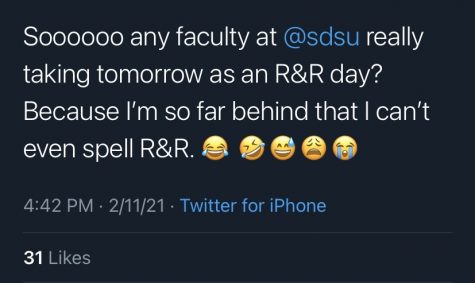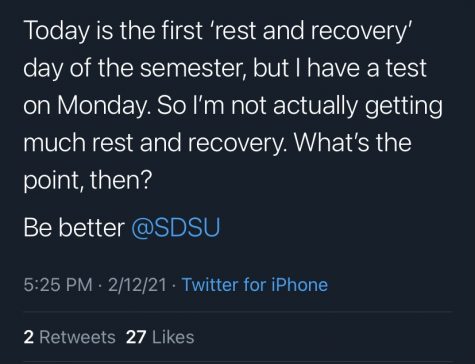Last December, San Diego State’s University Senate voted to remove spring break and replace it with four “rest and recovery days” spread throughout the semester. Over 700 students attended this meeting to express their opposition to the proposal and more than 16,000 people signed an online petition demanding the nine-day holiday be reinstated.
Following the decision, the university said they would work closely with faculty and staff to ensure class and work did not occur on these days. However, after the first recovery day on Feb. 12, many students said the time off made little to no difference.
“The first rest and recovery day was no different than a normal Friday for me. I still had work to do and to study for my classes,” Maddie Dennis, a second-year psychology student, said. “I do not think any of my professors specifically had assignments around the rest and recovery day, however, my workload did not decrease at all.”

Senators who supported this decision said their votes factored in concerns that students would use the traditional break to travel, resulting in a surge in COVID-19 cases in the SDSU community.
Yet, with classes mostly online students can log in anywhere there is a reliable internet connection.
“By taking away our break and it made it clear how little the school cares about their students’ mental health. One day off will not solve all our problems,” Dennis said. “I understand their reasoning regarding COVID-19 and not wanting students to travel, but the fact is that if students really wanted to travel they could with school being all online.”
Jessica Vargas, a first-year nursing student, said the spread out days will do very little to stop people from partying, but rather remove a critical period of rest.
“People may assume that we are sad about not having spring break because we cannot party – and that won’t stop those that do – but I don’t like to party,” Vargas said. “I just wanted spring break to mentally relax a bit because with online classes it’s straining to try and do so.”
While some of the scheduled rest days create long weekends, others such as March 30 and April 15, fall in the middle of the week.
“Having random days off throughout the semester isn’t really the same as getting a week off,” third-year journalism student Clare Botterill said. “Especially when some of the R&R days don’t fall immediately before or after a weekend, it doesn’t even feel like a day off since I’m still going to be doing the same amount of work as I would any day that I don’t have classes.”
Some students said their professors either pushed assignment due dates back a day or rescheduled tests and quizzes for the Monday following the recovery day. In one of Botterill’s classes, the professor didn’t even bother to do that, choosing to have an assignment due on the recovery day.
“My professors just made assignments that are normally due on Friday to be due on Saturday instead. One of them actually kept their Friday due date for an assignment,” Botterill said.

“I had three assignments for the same course due on Saturday, right after the first rest and recovery day. I spent Friday doing all the work for them,” Anoodnya Sangam, a fourth-year computer science major, said.
The next rest and recovery day is Monday, March 8. If students have comments about the recovery days or have concerns about professors assigning work due on the 8th, Associated Students has created Your Voice Matters, an opportunity for sharing these thoughts. The form can be found here.










